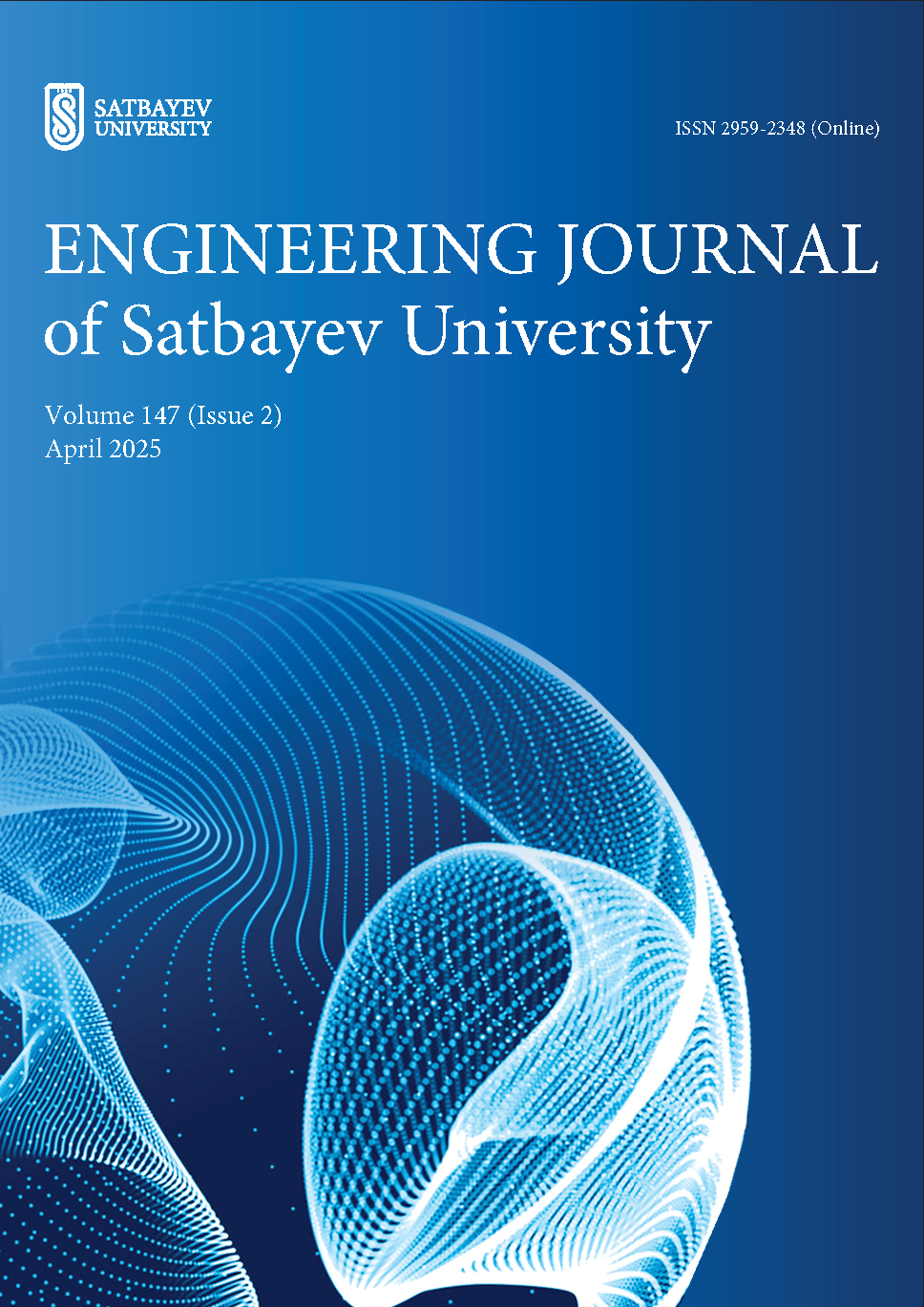Қазақстанның кондициялық емес бокситінен ағынды суларды тазарту үшін коагулянт алу технологиясы
##plugins.pubIds.doi.readerDisplayName##:
https://doi.org/10.51301/ejsu.2025.i2.04Ключевые слова:
боксит, технология, коагулянт, флокулянт, су тазарту, дисперстік құрамыАннотация
Қазақстанның маңызды экологиялық проблемаларының бірі – табиғи және сарқынды сулардың дұрыс сапалы түрде тазаланбауы. Себебі суды тазарту технологиясындағы негізгі, міндетті коагулянт реагентінің тапшылығы болып табылады. Құрамында алюминий бар табиғи және техногендік шикізатты модификацияланған аралас реагенттер-коагулянттар алу мақсатында кешенді өңдеуге болады. Қазақстан аумағында коагулянттар өндірісі үшін болашағы бар шикізат түрлерінің бірі – Краснооктябрь кен орнының кондициялық емес бокситтері болып табылады. Бұл мақалада рН кең диапазонында жоғары коагуляциялық қасиеттері бар тиімді коагулянтты – аралас сульфатты алюминий-темір – кремний коагулянтын (АСАТКК) – Краснооктябрь бокситін күкірт қышқылымен ыдырату арқылы, алюминий, темір және кремнийді паста фазасына барынша шығара отырып, коагулянт алу технологиясын әзірлеу бойынша түбегейлі жаңа тәсіл ұсынылған. Біз АСАТКК (аралас сульфатты алюминий-темір-кремний коагулянты) деп аталған коагулянттың мұндай құрамы қоршаған ортаның температурасы мен рН бойынша әсер ету ауқымын кеңейтуге мүмкіндік береді. Бұл тұрғыда кремний коагулянты қазіргі алюминий полиоксихлоридтері сияқты флокулянтсыз қолдануға болады. Коагулянттың құрамында алюминий, темір және кремний тұздарының бір мезгілде болуы «үшеуі бір» қасиеттерін біріктіруге мүмкіндік береді.
Библиографические ссылки
Teh, C.Y., Budiman, P.M., Shak, K.P.Y. & Wu, T.Y. (2016). Recent advancement of coagulation-flocculation and its application in wastewater treatment. Industrial & Engineering Chemistry Research, 55(16), 4363-4389. https://doi.org/10.1021/ACS.IECR.5B04703
Kingsley, O.I. (2019). Prospects and Challenges of Using Coagulation-Flocculation Method in the Treatment of Effluents, Advanced Journal of Chemistry, section A, 2(2), 105-127. https://doi.org/10.29088/SAMI/AJCA.2019.2.105127
Zubkova, O.S., Alekseev, A.I. & Zalilova. M.M. (2020). Research of Combined Use of Carbon and Aluminum Compounds for Wastewater Treatment. Izvestiya Vysshikh Uchebnykh Zavedenii, Seriya Khimiya i Khimicheskaya Tekhnologiya, 63(4), 86-91. https://doi.org/10.6060/ivkkt.20206304.6131
Dotto, J., Fagundes-Klen, M.R., Veit, M.T., Palácio, S.M. & Bergamasco, R. (2019). Performance of different coagulants in the coagulation/flocculation process of textile wastewater. Journal of Cleaner Production, (208), 656-665. https://doi.org/10.1016/j.jclepro.2018.10.112
Gan, Y., Li, J., Zhang, L., Wu, B., Huang, W., Li, H. & Zhang, S. (2021). Potential of titanium coagulants for water and wastewater treatment: Current status and future perspectives. Chemical Engineering Journal, (406), 126837. https://doi.org/10.1016/j.cej.2020.126837
Zhuang, J., Qi, Y., Yang, H., Li, H. & Shi, T. (2021). Preparation of polyaluminum zirconium silicate coagulant and its performance in water treatment. Journal of Water Process Engineering, (41), 102023. https://doi.org/10.1016/j.jwpe.2021.102023
Matveeva, V.A., Chukaeva, M.A. & Semenova, A.I. (2024). Iron ore tailings as a raw material for Fe-Al coagulant production. Journal of Mining Institute, (267), 433-443. https://pmi.spmi.ru/pmi/article/view/16474
Almeida, V.O., Schneider, I.A.H. (2020). Production of a ferric chloride coagulant by leaching an iron ore tailing. Minerals Engineering, (156), (106511). https://doi.org/10.1016/j.mineng.2020.106511
Naumov, K.I., Shvedov, I.M. & Maloletnev, A.S. (2014). Application of New Technologies for Producing Coagulant (Aluminum Sulfate) from Coal Waste. Mining Information and Analytical Bulletin, (5), 67-72.
Musina, U.Sh., Nureyev, S.S. & Kurbanova, L.S. (2007). Investigation of the process of obtaining a titanium-modified mixed sulfate coagulant from Krasnoktyabrsky bauxite. Bulletin of KazNTU named after K.I. Satpayev, (5), 137-139.
Valeev, D.V. (2015). Acid technology for the production of alumina and coagulants from Russian high-silica raw materials. II Russian Annual Conference of young researchers and postgraduates «Physico-chemistry and technology of inorganic materials».
Musina, U.Sh., Nurkeev, C.S., Kurbanova, L.S., Zharkimbaeva, G.B. & Ahmedova, G.R. (2007). Investigation of coagulating properties of a new inorganic coagulant. Hydrometeorology & Ecology, (1), 104-108.
Mondillo, N., Herrington, R. & Boni, M. (2021). Bauxite. Encyclopedia of Geology (Second Edition). https://doi.org/10.1016/B978-0-08-102908-4.00046-1
National Minerals Information Center. (2017). Bauxite and Alumina Statistics and Information. Retrieved from: https://minerals.usgs.gov/minerals/pubs/commodity/bauxite/
Kenzhaliev, B.K., Kuldeev, E.I., Abdulvaleev, R.A., Pozmogov, V.A., Beisembekova, K.O., Gladyshev, S.V. & Tastanov, E.A. (2017). Prospects for the development of the aluminum industry in Kazakhstan. News of the Academy of Sciences of the Republic of Kazakhstan. Series of Geology and Technical Sciences, 3(423), 151-160.
Bekturganov, N.S., Abisheva, Z.S., Abdulvaliev, R.A., Tastanov, E.A., Ahmedov, S.N., Medvedev, V.V. & Gladyshev, S.V. (2015). Perspektivy rasshireniya syr'evoj bazy alyuminievoj promyshlennosti Kazahstana. Resursosberegayushchie tekhnologii v obogashchenii rud i metallurgii cvetnyh metallov», Almaty
Загрузки
Опубликован
Как цитировать
Выпуск
Раздел
Лицензия
Copyright (c) 2025 Engineering Journal of Satbayev University

Это произведение доступно по лицензии Creative Commons «Attribution-NonCommercial-NoDerivatives» («Атрибуция — Некоммерческое использование — Без производных произведений») 4.0 Всемирная.
<div class="pkpfooter-son">
<a rel="license" href="http://creativecommons.org/licenses/by-nc/4.0/"><img alt="Creative Commons License" style="border-width:0" src="https://i.creativecommons.org/l/by-nc/4.0/80x15.png"></a><br>This work is licensed under a <a rel="license" href="http://creativecommons.org/licenses/by-nc/4.0/">Creative Commons Attribution-NonCommercial 4.0 International License</a>.
</div>





